Electrical safety is one of the cooperative's primary objectives. Management and staff strive constantly to maintain a safe working environment not only for cooperative personnel but for our members. Union County Electric's safety efforts include:
- Monthly safety messages in the cooperative newsletter
- Annual safety presentations made at local schools
- Monthly safety meetings for cooperative personnel
- Safety programs provided by SDREA, our statewide organization
- Annual CPR and First Aid Accreditation for cooperative personnel
- Annual meetings with irrigators with safety being a large part of the program
- Assistance with the trimming/removal of trees near power lines
- Securing of all cooperative equipment to protect the public
- Establishment of an accident investigation team so that if an accident does occur, steps are taken to ensure there is no repeat
Cooperative Principles
Voluntary and Open Membership
Cooperatives are voluntary organizations, open to all persons able to use their services and willing to accept the responsibilities of membership, without gender, social, racial, political or religious discrimination.
Democratic Member Control
Cooperatives are democratic organizations controlled by their members, who actively participate in setting policies and making decisions. The elected representatives are accountable to the membership. In primary cooperatives, members have equal voting rights (one member, one vote) and cooperatives at other levels are organized in a democratic manner.
Members’ Economic Participation
Members contribute equitably to, and democratically control, the capital of their cooperative. At least part of that capital is usually the common property of the cooperative. Members usually receive limited compensation, if any, on capital subscribed as a condition of membership. Members allocate surpluses for any or all of the following purposes: developing the cooperative, possibly by setting up reserves, part of which at least would be indivisible; benefiting members in proportion to their transactions with the cooperative; and supporting other activities approved by the membership.
Autonomy and Independence
Cooperatives are autonomous, self-help organizations controlled by their members. If they enter into agreements with other organizations, including governments, or raise capital from external sources, they do so on terms that ensure democratic control by their members and maintain their cooperative autonomy.
Education, Training, and Information
Cooperatives provide education and training for their members, elected representatives, managers and employees so they can contribute effectively to the development of their cooperatives. They inform the general public, particularly young people and opinion leaders, about the nature and benefits of cooperation.
Cooperation Among Cooperatives
Cooperatives serve their members most effectively and strengthen the cooperative movement by working together through local, national, regional and international structures.
Concern for Community
While focusing on member needs, cooperatives work for the sustainable development of their communities through policies accepted by their members.



 Member
Member